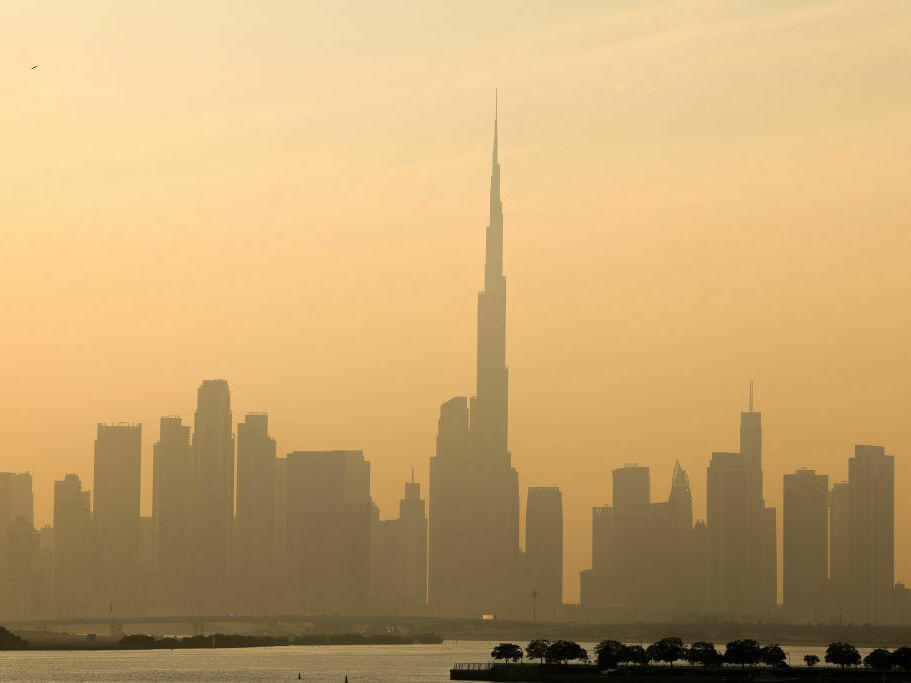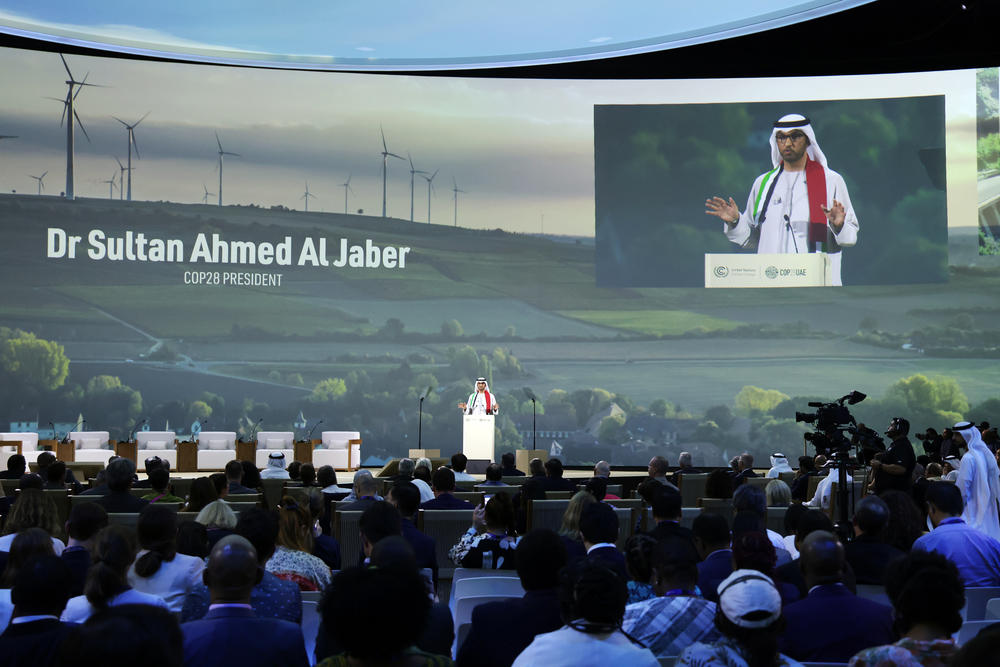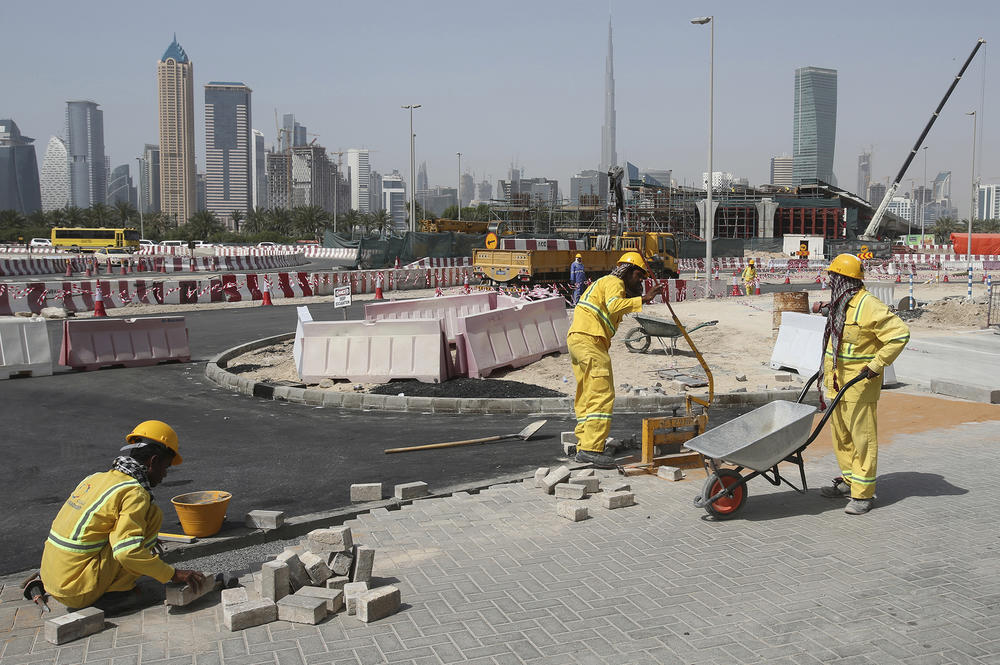Section Branding
Header Content
What it means for an oil producing country, the UAE, to host U.N. climate talks
Primary Content
DUBAI, United Arab Emirates — World leaders, climate activists, scientists, business executives and a slew of lobbyists are in Dubai for the annual United Nations climate negotiations.
The talks, known as COP28, are taking place in the United Arab Emirates, one of the world's biggest oil and gas producers, and the fossil fuels industry's presence can be seen everywhere at the sprawling conference complex.
The UAE chose Sultan al-Jaber to preside over the talks. He's the chairman of the state-backed renewable energy company, Masdar, but he's also the chief executive of Abu Dhabi's state-owned oil company, ADNOC.
That has left many at COP28 concerned that the interests of oil companies and fossil fuel producers are influencing this year's summit, despite billions of dollars allocated by the UAE toward renewable energy projects at home and abroad.
The stakes are high for these talks: Scientists say to keep temperatures from rising past 1.5 degrees Celsius (2.7 degrees Fahrenheit), the world has to make dramatic cuts to carbon dioxide emissions that mainly stem from burning oil and gas. They say the world needs to halve emissions by 2030, and by 99% by 2050. But if getting there can only come by making deep cuts to fossil fuels, this poses a threat to the coffers of oil and gas producers, including the UAE.
The question of what the world will agree to do about the use of fossil fuel looms large as the negotiations draw to a close in the coming days and countries hammer out an agreement, all of it shepherded by the UAE. The final text at COP28 laying out the world's next steps to address climate change will require the consensus of nearly 200 countries.
Climate talks focused on fossil fuels, but consensus needed
The U.N. secretary-general opened COP28 with a plea to countries to "stop burning fossil fuels."
The man leading these talks, al-Jaber, has used more temperate language around the continued use of fossil fuels, saying a phasedown is inevitable. But in a speaking engagement just before COP28, he insisted incorrectly that there is "no science" that a phase out of fossil fuels will keep global temperatures from rising. Al-Jaber later said his comments had been misinterpreted and insisted the UAE understands the urgency of this matter, adding "we very much believe and respect the science."
The language around timelines for phasing down or phasing out fossil fuels is at the heart of this climate conference, and it can determine humanity's chances of keeping the 1.5 degree Celsius target within reach, according to scientists and climate experts.
Scientists say humanity will be at great risk of even more devastating droughts, fires, extreme storms and the loss of nearly all coral reefs if temperatures rise past 1.5 degrees Celsius. Already, global temperatures have risen about 1.2 degrees Celsius over the last 150 years. And this year was the hottest on record globally, according to the World Meteorological Organization.
Across the sprawling complex in the desert that's the site of COP28, pictures of beekeepers stand alongside broadly-worded slogans urging participants to stay focused on keeping Earth from warming past 1.5 degrees Celsius.
The UAE is no stranger to heat and the impacts of climate change. But the question at this climate summit is whether countries that rely on fossil fuels to grow their economies, like India and China, or to sustain them, like Gulf Arab producers and Russia, will agree to the language needed to cut carbon emissions and phase out the use of oil and gas.
The UAE opened the summit with a $100 million pledge to a new fund to help developing nations impacted by climate change. The summit also announced pledges by more than 100 countries to triple renewable energy generation capacity.
Climate Envoy of the Republic of the Marshall Islands, Tina Stege, said pledges to triple renewables is only "half the solution." The other half is reducing fossil fuel use. Otherwise, small-island countries like the Marshall Islands risk being swamped by rising sea levels.
"The pledge can't greenwash countries that are simultaneously expanding fossil fuel production," Stege said. "The COP President must deliver an outcome at this COP that achieves a genuine pathway to 1.5 that phases out fossil fuels."
Blunt slogans demanding an immediate end to oil and gas are plastered inside the booths and pavilions run by activist groups and grassroots organizations at the COP28 summit.
UAE supports renewable energy and pledges net-zero
Last year, the UAE joined a growing list of countries pledging net-zero by 2050, something countries can reach by cutting emissions or offsetting them in other ways.
The UAE has also been an early Gulf investor in the energy transition toward renewables, particularly through Masdar, the Abu Dhabi-based company whose chairman is al-Jaber.
As countries like the UAE and major oil producer Saudi Arabia transition to renewables and roll out plans to cut oil and gas at home, they will export what they don't use in the future to oil-hungry nations like China. So whatever emissions oil producing countries avoid domestically will get pumped into the air of other countries.
China is the world's largest emitter of the greenhouse gas pollution heating the planet, followed by the United States. China and the U.S. are also the world's top importers of crude oil.
UAE backs calls for more oil and gas production
To meet the growing global demand for oil, the UAE is working to increase its oil production capacity by a million barrels per day by 2027 to reach 5 million barrels daily.
The International Monetary Fund says hydrocarbons make up 60% of the country's revenue.
The oil cartel, OPEC, of which the UAE is a member, forecasts that as populations around the world expand, demand for oil will increase too, particularly for transportation needs.
OPEC, which has a pavilion at the U.N. climate conference, says $14 trillion in investments in crude oil are needed by 2045 to keep up with demand. The organization argues it's "misguided" to no longer invest in new oil projects.
UAE officials have also argued the world needs more oil, not less. Al-Jaber has previously said the world cannot unplug the current energy system before building a new one.
And yet that's exactly what scientists and others say has to happen to keep the planet from heating up and surpassing 1.5 degrees Celsius.
The United Nations Intergovernmental Panel on Climate Change and other international organizations say that to address climate change investments must shift toward renewables and away from new fossil fuel projects.
The International Renewable Energy Agency says the world must take "radical action" and invest $5.7 trillion each year through 2030 to shift away from fossil fuels.
Oil producers face tough choices on climate change
The UAE, like other Arab oil and gas producers, is impacted by extreme heat and humidity levels that restrict life for much of the summer, pushing people indoors
Governments in Arab countries have laws limiting the daytime hours that millions of low-paid migrant workers can work outside during the hottest summer months of the year. Even so, rights groups say heat-related deaths do happen.
A Human Rights Watch analysis found current air pollution levels remain alarmingly high in the UAE. The group said in its report that due to a lack of tolerance for dissent, it is "extremely difficult, if not impossible, in the UAE to freely scrutinize and openly speak about the weakness of its air pollution policies."
Despite these climate challenges, oil and gas production is credited for helping transform Gulf Arab societies from disparate desert communities and fishing villages into nations with international clout, modern skylines, world-class airlines, global attractions, like the world's tallest tower in Dubai, and large defense spending budgets.
Domestically, oil revenue has also helped maintain public support for the region's ruling families and monarchs. In the UAE, oil wealth and government policies have ensured Emiratis are afforded free healthcare and higher education, affordable housing, well-paid government jobs, low-taxes and generous pensions.
As head of Abu Dhabi's state oil company and the president of this COP, al-Jaber has made clear he believes engaging energy companies at these talks can help "fast-track this transition." He's pushing energy companies to reduce their emissions in the extraction and production of oil and gas, and wants these companies to play a role at this conference.
"Let history reflect the fact that this is the presidency that made a bold choice to proactively engage with oil and gas companies," al-Jaber told COP28 delegates.
Copyright 2023 NPR. To see more, visit https://www.npr.org.



